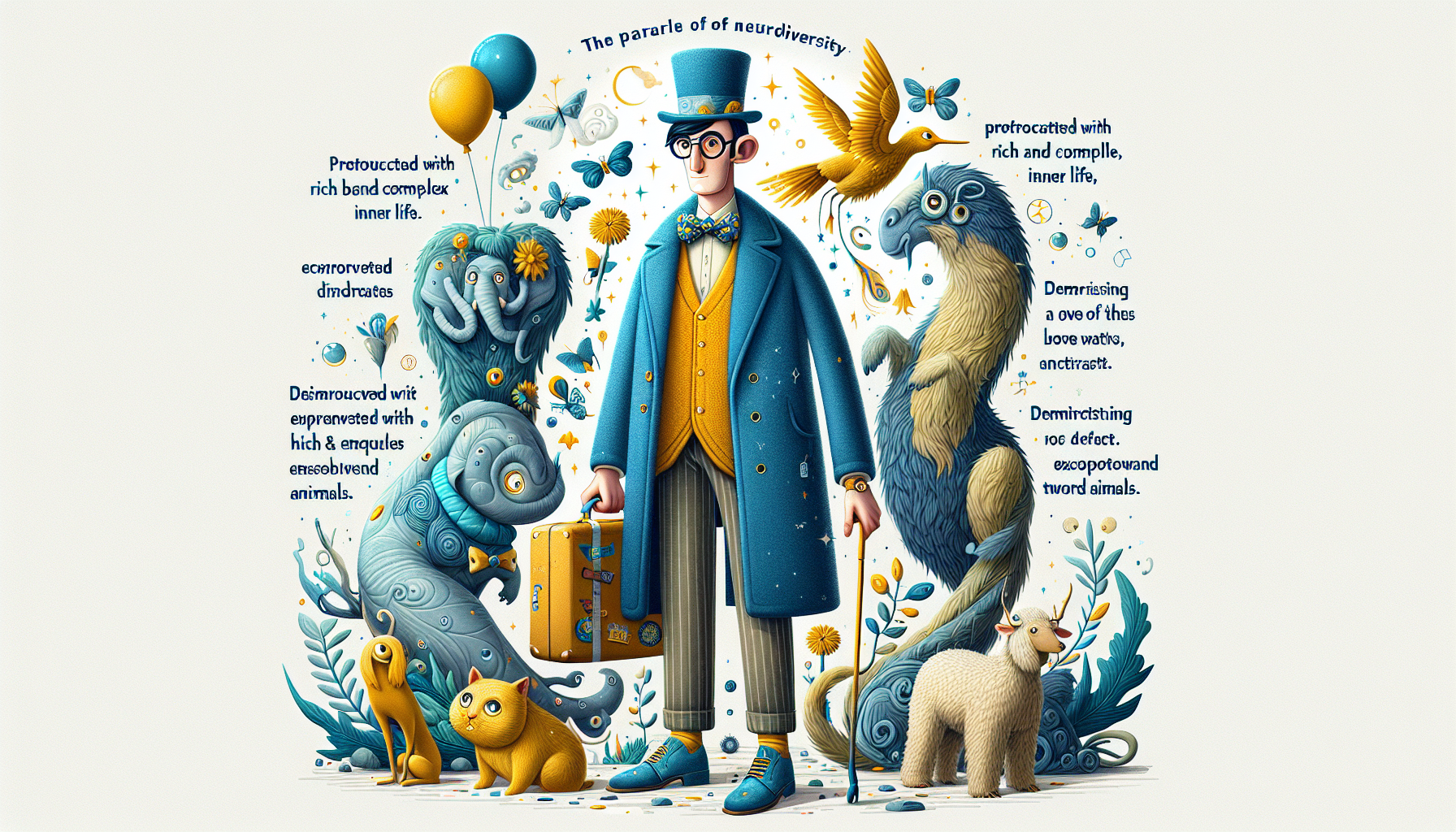Understanding Newt Scamander
Newt Scamander, the protagonist of J.K. Rowling’s “Fantastic Beasts” series, has sparked speculation among fans regarding whether he might be on the autism spectrum. While it has not been confirmed whether Newt is autistic, his character traits have led to meaningful discussions about representation and neurodiversity in popular media.

Character Analysis
Newt Scamander often struggles with conventional social norms and finds it challenging to connect with others on an emotional level. He tends to prefer the company of animals, demonstrating a deeper understanding and connection with them compared to humans. This behavior is reminiscent of difficulties with social interaction commonly associated with autism spectrum disorder. Establishing and maintaining eye contact, engaging in small talk, and participating in casual conversations are areas where Newt exhibits challenges.
Behavior Traits
Newt Scamander exhibits several traits often associated with autism, including sensory sensitivities and a strong preference for routines. He demonstrates sensitivity to certain sounds, particularly loud or sudden noises, and exhibits discomfort or reluctance when someone touches him. This aligns with the sensory sensitivities commonly observed in individuals with autism. Additionally, Newt follows a structured schedule and exhibits discomfort when his routines are disrupted, reflecting the adherence to routines commonly seen in individuals on the autism spectrum.
Furthermore, Newt Scamander’s deep knowledge and devotion to magical creatures represents a special interest commonly observed in individuals with autism. His intense focus and dedication to this particular interest are reminiscent of the obsessive interests frequently seen in individuals on the autism spectrum.
While the portrayal of Newt Scamander’s character traits has led to speculation and analysis, it is essential to remember that autism is a complex spectrum, and not all individuals on the spectrum exhibit the same behaviors or traits. The portrayal of autism traits in Newt Scamander’s character provides an opportunity for discussion and analysis, contributing to a better understanding of autism and promoting acceptance and inclusivity.
Exploring Autism Speculation
The character of Newt Scamander, protagonist of J.K. Rowling’s “Fantastic Beasts” series, has sparked speculation among fans about whether he might be on the autism spectrum. Let’s delve into the fan interpretations and expert opinions surrounding this topic.
Fan Interpretations
Many fans have observed certain character traits in Newt Scamander that align with characteristics commonly associated with autism spectrum disorder. These include:
- Difficulty in establishing and maintaining eye contact
- Struggles with small talk and casual conversations
- Appears more comfortable interacting with creatures than with people
These observations have led fans to speculate that Newt Scamander may exhibit autistic traits, although it has not been confirmed within the storyline.
Expert Opinions
Experts in the field of autism have also weighed in on the speculation surrounding Newt Scamander’s character. While they acknowledge the presence of certain behaviors that align with autism, they emphasize the need for caution when making conclusions based solely on fictional characters.
It’s important to note that autism is a complex spectrum disorder, and individuals may exhibit a wide range of behaviors and characteristics. While Newt Scamander’s character may display traits associated with autism, it’s essential to approach this interpretation with sensitivity and respect for the diversity of experiences within the autism community.
The portrayal of Newt Scamander’s character has sparked meaningful discussions about representation and neurodiversity in popular media, providing an opportunity to increase awareness and understanding of autism spectrum disorder.
While fan interpretations and expert opinions offer valuable insights, it should be noted that the confirmation of Newt Scamander’s character being on the autism spectrum has not been explicitly stated within the storyline. The interpretation of his character as aligning with autistic traits adds depth to the conversation surrounding autism representation in popular media.
By exploring these different perspectives, fans and individuals interested in the topic can engage in a broader discussion about the portrayal of autism in fictional characters and the impact of such representation on society.
Comparing Traits to Autism
In analyzing the character of Newt Scamander from J.K. Rowling’s “Fantastic Beasts” series, many fans and experts have speculated about the possibility of him being on the autism spectrum. Certain behavioral traits exhibited by Newt align with characteristics commonly associated with autism spectrum disorder. In this section, we will explore three specific traits: social interaction, sensory sensitivities, and special interests.
Social Interaction
Newt Scamander often struggles with conventional social norms and finds it challenging to connect with others on an emotional level. He tends to prefer the company of animals and demonstrates a deeper understanding and connection with them compared to humans. This difficulty in establishing and maintaining meaningful social interactions aligns with the social communication challenges often observed in individuals with autism.
Sensory Sensitivities
Throughout the movies, Newt Scamander displays sensitivity to certain sensory stimuli, such as loud noises or crowded environments. He often seeks solace in quieter and more controlled environments. This sensitivity is reminiscent of the sensory sensitivities frequently associated with autism. Individuals on the autism spectrum may experience heightened sensitivity or aversion to certain sounds, textures, or sensations.
Special Interests
Newt Scamander’s deep knowledge and devotion to magical creatures represent a special interest commonly observed in individuals with autism. He exhibits a passion for studying and protecting these creatures, displaying intense focus and dedication to this particular interest [2]. This intense focus and preoccupation with specific topics or activities is a characteristic often associated with autism.
By comparing Newt Scamander’s character traits to those commonly observed in individuals with autism, it becomes apparent that there are significant parallels. However, it’s important to note that the character’s portrayal does not explicitly state that he has autism. The representation of Newt Scamander’s character with autism-like traits provides an opportunity for discussion and analysis, contributing to a better understanding of autism and promoting acceptance and inclusivity. It also allows individuals with autism to feel seen, understood, and less alone in their experiences.
Eddie Redmayne’s Perspective
Eddie Redmayne, the talented actor who portrays Newt Scamander in the “Fantastic Beasts” series, has provided insights into his interpretation of the character and the possible connection to autism. Redmayne believes that Newt Scamander exhibits traits that align with being on the autism spectrum, specifically mentioning Asperger’s syndrome. While the term “Asperger’s” was not widely used during Newt’s lifetime, it is now recognized as part of the autism spectrum.
Actor’s Insights
In his portrayal of Newt Scamander, Eddie Redmayne has observed various qualities that he believes point towards the character having Asperger’s or being on the autism spectrum. When J.K. Rowling first described Newt’s character, Redmayne noticed traits such as the way he walked, looked, and his lack of eye contact, which are often associated with individuals on the autism spectrum. Redmayne’s insights provide a valuable perspective on how he approached the character, adding depth and authenticity to Newt’s portrayal.
Interpretation of Character
Fans of the “Fantastic Beasts” series have long speculated about Newt Scamander’s potential placement on the autism spectrum [1]. Newt’s mannerisms, interactions with people, and his deep connection with magical creatures have led many to draw comparisons to individuals with autism. Newt’s difficulty in establishing and maintaining eye contact, struggles with small talk and casual conversations, and his seeming preference for interacting with creatures rather than people are traits often associated with autism spectrum disorder.
Eddie Redmayne’s interpretation of Newt Scamander aligns with these fan speculations. He believes that Newt’s personality, as portrayed in the films, exhibits traits commonly associated with autism. Newt’s sharp attention to fine details, occasional lack of concern for the outcomes of his words and actions, and awkward behavior around different people contribute to the perception that he may be on the autism spectrum.
By considering Eddie Redmayne’s perspective and interpretation of Newt Scamander, we gain a deeper understanding of the character and the connection that has been made between Newt and autism. This portrayal has sparked conversations about representation and the significance of showcasing diverse characters on screen. The inclusion of a character like Newt Scamander contributes to greater understanding and acceptance of individuals with autism within popular culture and the wider community.
Impact on Representation
The portrayal of Newt Scamander’s character traits has sparked discussions and analysis within the autism community, leading to a better understanding of autism and fostering acceptance and inclusivity. The cultural significance of representing autism traits in a popular character like Newt Scamander cannot be overlooked. It provides individuals with autism a sense of being seen, understood, and less alone in their experiences.
Cultural Significance
Positive representation of autism in popular media challenges stereotypes and misconceptions, breaking down barriers and fostering a more inclusive society. By having a character like Newt Scamander, who displays autism traits, audiences are exposed to a more accurate and nuanced portrayal of neurodivergent individuals. This representation helps challenge stigmas and promotes understanding and acceptance of individuals with autism. It provides an opportunity for education and opens up conversations about neurodiversity.
Community Response
The response from the autism community to Newt Scamander’s character has been largely positive. Many individuals have expressed gratitude for the representation and how it has made them feel seen and validated in their experiences. Seeing a character like Newt Scamander on screen can help reduce feelings of isolation and provide a sense of belonging. It also encourages discussions within the community, fostering a deeper understanding of autism and promoting self-advocacy.
Additionally, the impact goes beyond the autism community. The portrayal of autism traits in a beloved character like Newt Scamander has sparked conversations among a broader audience. It increases awareness about the unique perspectives and needs of individuals with autism, promoting empathy and understanding. This positive representation can lead to societal shifts in attitudes towards neurodiversity and create a more inclusive and accepting environment for all.
The cultural significance and community response to Newt Scamander’s character with autism traits highlight the importance of accurate and positive representation in popular media. By promoting understanding, challenging stereotypes, and fostering inclusivity, characters like Newt Scamander can have a lasting impact on societal perceptions of autism and pave the way for greater acceptance and support.
Future of Newt Scamander
As fans eagerly await the next installment of the “Fantastic Beasts” franchise, the future of Newt Scamander’s character holds much anticipation and excitement. The upcoming film, “Fantastic Beasts: The Secrets of Dumbledore,” is set to be released on April 15, and it promises to continue the adventures of Newt Scamander. This film presents an opportunity for further exploration of Newt’s character and potentially provides more insight into his unique traits and behaviors.
Upcoming Film
“Fantastic Beasts: The Secrets of Dumbledore” is expected to delve deeper into Newt Scamander’s character, providing additional insights and development. Fans eagerly anticipate the release to see how Newt’s story unfolds and if further exploration of his character will shed light on his potential neurodivergent traits. This upcoming film will likely offer new revelations and a deeper understanding of Newt’s personality and experiences.
Continued Exploration
With each new installment in the “Fantastic Beasts” series, there is an opportunity for continued exploration of Newt Scamander’s character. Fans hope for further insights into his unique traits and behaviors, which have sparked discussions about the representation of neurodivergent individuals in popular media.
As the franchise progresses, there is a possibility that Newt’s character will be further developed, providing a deeper understanding of his potential neurodivergent traits. This continued exploration can contribute to a greater representation of diverse experiences and foster a better understanding and acceptance of individuals who may have similar traits to Newt Scamander.
In conclusion, the future of Newt Scamander holds great promise, with the upcoming film “Fantastic Beasts: The Secrets of Dumbledore” expected to provide further insights into his character. Fans eagerly await the release, hoping for continued exploration and a deeper understanding of Newt’s unique traits and potential neurodivergent traits.
References
- https://www.goldstarrehab.com/parent-resources/newt-scamander-autism
- https://www.adinaaba.com/post/does-newt-scamander-have-autism
- https://www.myteamaba.com/resources/does-newt-scamander-display-autism-traits
- https://wegotthiscovered.com/movies/does-newt-scamander-have-a-disability-in-fantastic-beasts/
- https://www.crossrivertherapy.com/autism/does-newt-scamander-have-autism

 We've just released an article!
Check out our blog!
We've just released an article!
Check out our blog!



